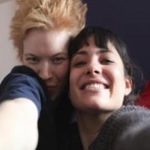

Despite working professionally in the domestic violence field for 10 years, I became a victim of domestic violence. It happened to me, and it could happen to you too.
While I was in graduate school studying social work, I worked at a domestic violence shelter in Washington, D.C. working directly with women and their children who were fleeing from domestic violence. Later I went on to do local policy work in D.C., focusing on improving the laws and protections for victims and survivors and making the legal and social service systems better and more responsive to victims. I also served on the Board of Directors for the Rainbow Response Coalition for five years, Co-Chairing the only organization in D.C. that focuses exclusively on LGBTQ intimate partner violence (IPV). I could explain the dynamics of domestic violence in my sleep. I trained nationally and internationally regarding the intricacies of LGBTQ IPV and the barriers they face in trying to access help; included in the audiences of these trainings were domestic violence advocates, attorneys, police officers, probation/parole officers, prosecutors, government officials, court officials, etc. Despite my extensive background and knowledge of domestic violence, none of this enabled me to realize that my own two-year marriage was abusive.
Only after reaching a breaking point in my marriage and speaking with friends and coworkers in the field did I realize I had been manipulated, psychologically abused, emotionally worn down and purposefully distanced from my friends. After intense threats, erratic and increasingly disturbing and violent behavior and a deep fear of not being able to make it out of my house without being physically harmed, I knew I needed to leave and get a protection order (also known as a restraining order).
Luckily, I had friends who took me in and helped me figure out literally where to go next. I found myself in horrible circumstances: I had just recently moved to a new apartment and now I had to figure out where to live next, figure out how to break my lease with as few consequences to me as possible, come up with another security deposit, and most importantly, I needed an attorney to help me get a protection order so I could be legally protected from further abuse, intimidation, harassment and violence. Despite recently starting my dream job, I didn’t make that much money, my household income suddenly dropped when I had to flee, and I lived in one of the most expensive cities in the U.S. I was in no position to be able to afford a private attorney, yet I also made too much money to be able to receive free legal help from the majority of non-profit agencies with which I used to work.
I was overjoyed when I was reminded of the Network for Victim Recovery of DC (NVRDC), a new organization serving victims of crime without income restrictions: they were the only agency in D.C. that could help me. My attorney there helped me get a Civil Protection Order (CPO) for one year, despite a day two trial, an almost unheard of amount of time for any CPO case. Thankfully I worked for an employer that was very accommodating in terms of giving me time off from work to attend to the numerous court preparations and proceedings, something that not all victims receive. Shortly after being granted a CPO, my identity was mysteriously stolen and my credit was sabotaged. Thankfully NVRDC had another attorney who was an expert in identity theft. Since then, I’ve filed criminal contempt charges twice against my wife for violating the order, and my identity was stolen a second time, leaving my credit in shambles.
Had NVRDC not existed, there is no way I could have afforded to hire a private attorney to help me get a CPO, especially while I was in the middle of spending an enormous amount of money to rent another apartment, move, and buy all the furniture and household items I had to leave behind to escape. My safety was more important than any item I owned, but it was infuriating to have to scrape money together to buy many of the items I had just recently purchased. I left with my clothes and a mattress and not much more. No table to eat at, and no couch to sit on as I cried.
I’ve made a lot of progress since then and no longer am haunted by feelings of guilt or incapacitating anxiety and worry. I’m happy to finally be starting the divorce process and to put this part of my life to rest. But part of my healing process is to give back to those who have helped me along this difficult journey and to educate others about LGBTQ intimate partner violence. You are no different than I. And unlike the stereotypical image of domestic violence that we all have in our head, it affects our community at the same rate as the heterosexual community. It is estimated that 1 in 4 lesbians and bisexual women will become victims of intimate partner violence at some point in their lives. It’s also a problem that doesn’t discriminate on the basis of gender identity, socio-economic status, education level, or against people working professionally in the field of domestic violence. October has just ended, which is Domestic Violence Awareness Month, and I hope my story inspires you to get involved or help those in our own community who are facing this incredible calamity.
To learn more about NVRDC please visit www.nvrdc.org or to hear more about my story please visit http://www.razoo.com/story/Hope-In-The-Midst-Of-Adversity
Save